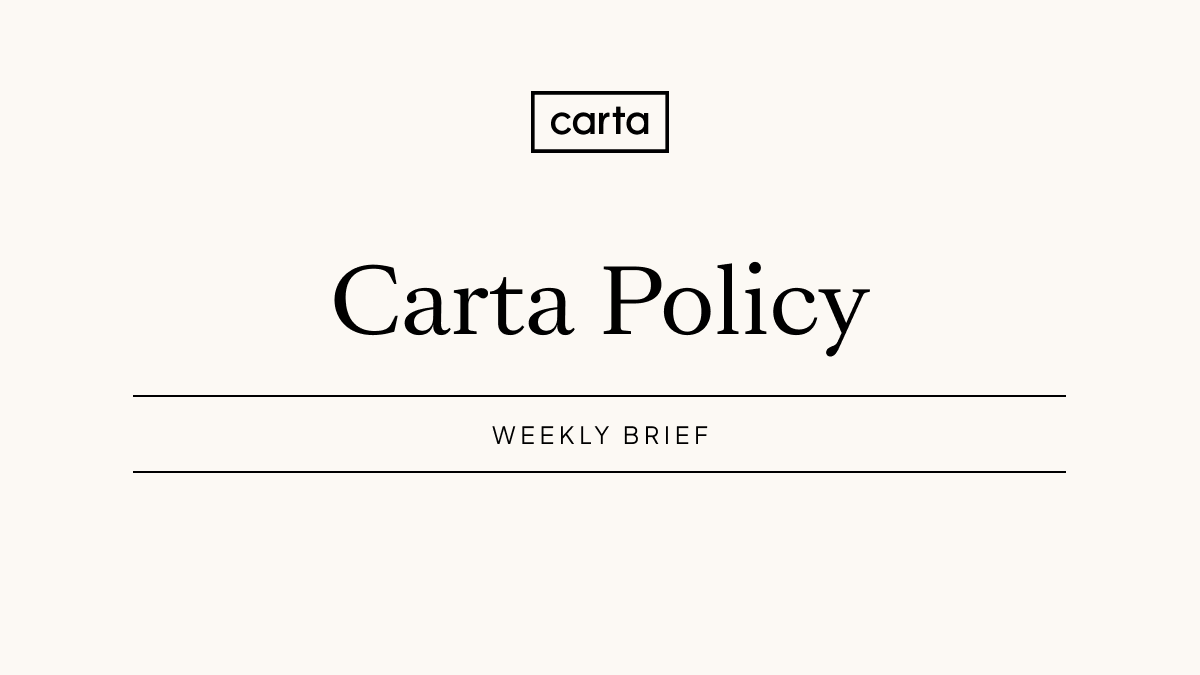Topline
-
The path ahead for the bipartisan tax deal
-
SEC Commissioner Uyeda cautions SEC against more restrictive accredited investor definition
-
SEC finalizes SPAC disclosure rules
-
State-level Corporate Transparency Act law passed in New York
-
Carta to host informational Corporate Transparency Act virtual event
The path ahead for the bipartisan tax deal
The House plans to vote on the bipartisan tax package next week. If approved, the legislation will go to the Senate for consideration. As detailed last week, the package included core priorities for both Republicans (research and development (R&D) expensing) and Democrats (Child Tax Credit (CTC) expansion). Although disagreement over key provisions persist, the package received broad bipartisan support at the committee level, which hopefully signals that even if not a smooth path forward, Congress will pass the legislation.
The Deal: Congress’ tax deal centers on two partisan provisions:
-
Restarting key business tax provisions: The proposal would retroactively revive three expired business tax provisions from the Tax Cuts and Jobs Act (TCJA): full expensing of R&D, net interest expensing, and accelerated bonus depreciation. This is the major priority for Republicans.
-
Expansion of the CTC: The proposed laddered expansion of the CTC would increase the amount of refundable CTC from $1,600 per child to $1,800 in tax year 2023, $1,900 in tax year 2024, and $2,000 in tax year 2025. Expanding the CTC is a priority for Democrats.
For a summary of the tax framework, see here.
Path forward: The far-right Freedom Caucus has been unusually quiet but represents the biggest threat to House passage. The House needs a two-thirds majority to pass the legislation without triggering a rule procedure, which will jeopardize passage. Speaker Johnson will need strong bipartisan support and continues to push forward, signaling confidence the House will approve the bill. A few potential hurdles remain in the way.
Additionally, pressure continues from a small but dogged group of lawmakers in the House — Democrats and Republicans— to attach a rollback of the state and local tax limit, which would benefit their high-cost constituencies.
On the Senate side, we have seen more posturing with some Senate Republicans raising concerns:
-
Misaligned incentives: The CTC is too expansive, and would incentivize some parents to withdraw from the workforce.
-
Pay-for gimmick: The estimated savings created by the package are misleading, as they rely on the IRS rolling back a controversial pandemic-era corporate tax credit program.
For the most part, this faction of Senate Republicans have raised concerns without signaling outright opposition, but the posturing indicates this process may not be entirely smooth. The first test will be the House vote. If strong and bipartisan, expect the pressure on the Senate to ratchet up.
R&D Expenditures - Call to Action
Carta supports the restoration of full R&D under section 174 of the Internal Revenue Code. Let your congressional representatives know that R&D matters to the innovation community. Reach out to your U.S. Senators and House Representatives to pass H.R. 7024 by downloading the email template here.
SEC Commissioner Uyeda cautions SEC against more restrictive accredited investor definition
SEC Commissioner Mark Uyeda raised concerns this week about the SEC’s private market rulemaking agenda. Instead of changes that could potentially have a chilling effect on the startup ecosystem, Uyeda suggested streamlining the exempt offering process to make the capital raising process easier to navigate and expanding access to private market investment opportunities by allowing individuals to invest a certain percentage of their assets in private market securities as part of a diversified portfolio.
As a reminder, the SEC is expected to propose a number of items that could have a significant effect on how private capital is raised, including:
-
Changes to Regulation D: While the Commission has not formally proposed any such changes, commissioners have signaled support for enhancing Form D filing requirements and adding disclosure components to the Regulation D, which could create additional friction points for private funds and companies seeking to raise capital in the private markets.
-
Adjustments to the accredited investor thresholds: The SEC is expected to increase the wealth and income thresholds for individuals to qualify as accredited investors, which Uyeda cautioned would have a negative and disproportionate impact on investors and entrepreneurs from historically underrepresented communities.
Why it matters: Commissioner Uyeda’s comments are largely in line with capital formation agendas in both the House and Senate, and there is significant bipartisan support for preserving the current accredited investor thresholds and expanding onramps. With a 3-2 majority, however, Chair Gensler will be able to advance his more contrasting agenda, but industry engagement and pressure from Congress could help shape some of the more problematic aspects of these anticipated actions. Carta will continue working to expand access to capital and ownership opportunities to support founders, investors, and employees in the innovation economy.
SEC finalizes SPAC disclosure rules
This week, the SEC voted along party lines to finalize new rules for initial public offerings (IPOs) and related transactions for special purpose acquisition companies (SPACs) to more closely align the requirements and liability with the traditional IPO process.
The final rule would:
-
Require disclosures about SPAC sponsor compensation, conflicts of interest, dilution, and the target company
-
Make the safe harbor from liability for forward-looking statements unavailable to SPACs and other blank check companies
-
Require the target company to become a co-registrant with the SPAC and assume responsibilities for disclosures in registration statement in certain instances
The SEC softened aspects of the proposed version, notably dropping a proposed 18-to-24-month window for SPACs to complete mergers or lose legal protections, as well as a proposed requirement that would have required some SPAC IPO participants to be underwriters in the subsequent mergers. The final rules issue guidance on these points instead.
Why it matters: SPAC transactions have dramatically declined since the boom in 2021 largely due to increased regulatory scrutiny and waning investor interest. Even though private companies and the broader market are trying to assess when the IPO window will open, this final rule may make SPACs even less appetizing as a path forward.
State-level Corporate Transparency Act law passed in New York
In line with the federal Corporate Transparency Act (CTA), states are beginning to adopt their own CTA requirements in order to collect beneficial ownership information. New York Governor Hochul recently signed the LLC Transparency Act (LLCTA) into law, and while the state law mirrors the CTA in many key respects, a few important differences include:
-
Certain LLCs exempt from the LLCTA’s beneficial ownership information reporting must still make filings to certify their exemption (no filing is required for exempt entities under the CTA).
-
Updated information must be filed within 90 days (within 30 days under the CTA).
-
The civil penalty for noncompliance with the LLCTA is $250 and can be mitigated ($500 per day, up to $10,000 under the CTA).
What’s next: The LLCTA becomes effective on December 21, 2024. LLCs formed on or before December 21, 2024 must file required information by January 1, 2025 and LLCs formed after the effective date must submit beneficial ownership information at incorporation.
Carta Virtual Event with Treasury Department’s Financial Crimes Enforcement Network
The Corporate Transparency Act (CTA) requires the U.S. Department of Treasury’s Financial Crimes Enforcement Network (FinCEN) to collect beneficial ownership information (BOI) from millions of entities, mainly small businesses and startups. The new CTA filing requirements began January 1, 2024, and business entities subject to the rules face significant new reporting and recordkeeping obligations.
Join us on January 30 at 10 a.m. PT/ 1 p.m. ET for an exclusive webinar with FinCEN’s Senior Regulations Advisor, David King, along with Carta’s VP and Chief Compliance Officer Rachel Sapers and Policy Director Amy Miller to explore an in-depth review of the CTA’s reporting requirements.

Register here and submit your questions about CTA filing ahead of the virtual event to have them answered live.
Register for Carta’s Innovators Summit
On February 13, Carta is hosting its annual Carta Innovators Summit: a free, virtual event celebrating innovators and innovation in all forms. Hear from the innovators sparking change as they discuss building lasting LP relationships, innovative approaches to GTM, navigating term sheets and deal dynamics, and much more. Register here.
News to know
-
Senate Dems push FTC to investigate ERTC issues. Sen. Catherine Cortez Masto led eight other Democratic senators in a letter requesting that the FTC investigate the practices that led to the IRS’s moratorium on processing employee retention tax credits (ERTC). The IRS paused processing ERTC claims in September 2023 due to widespread fraud in the program.
-
FINRA sweep finds widespread rule violations. FINRA disclosed that a sweep of crypto asset communications initiated in November 2022 found broad violations of FINRA Rule 2210. It found potential violations in 70% of over 500 reviewed communications, but most of those in violation were distributed by a handful of firms. The communications may have violated Rule 2210 by including a range of misleading statements or misrepresentations related to federal securities law and the crypto asset, among other issues.
-
FTC releases 2024 HSR thresholds. The FTC announced the 2024 adjusted thresholds under the Hart-Scott-Rodino Antitrust Improvements Act of 1976, which will take effect 30 days after publication in the Federal Register. These thresholds change from year to year. The FTC also released revised thresholds for interlocking directorates as required under the Clayton Act.
-
FTC hosts AI-focused Tech Summit. The FTC convened a day-long summit focused on artificial intelligence and (1) chips and cloud, (2) data and models, and (3) consumer applications. Chair Lina Khan and Commissioners Rebecca Kelly Slaughter and Alvaro Bedoya spoke at the event, as well as the directors of the Bureaus of Competition and Consumer Protection.
-
SEC, FINRA, and NASAA issue joint investor alert on AI fraud. The Investor Alert cautioned against increased investment frauds involving artificial intelligence, specifically calling out the threat of unregistered/unlicensed investment platforms who claim to use AI and the use of AI technology such as deepfakes to spread misleading information. The alert also cautions investors against relying on AI-generated information in making investment decisions.
Upcoming events
-
House Financial Services Committee: Better Investment Barriers: Strengthening CCP Sanctions and Exploring Alternatives to Bureaucratic Regimes - January 30 at 7:00 a.m. PT / 10:00 a.m. ET
-
House Committee on Small Business hearing: Pathways to Success: Supporting Entrepreneurs and Employees with Disabilities - January 30 at 7:00 a.m. PT / 10:00 a.m. ET
-
Carta event: Corporate Transparency Act: What Business Owners Need to Know - January 30 at 10:00 a.m. PT / 1:00 p.m. ET
-
SEC Open Meeting - January 31 at 6:00 a.m. PT / 9:00 a.m. ET
-
House Financial Services Committee: Rules Without Analysis: Federal Banking Proposals Under the Biden Administration - January 31 at 7:00 a.m. PT / 10:00 a.m. ET
-
CFTC Commissioner Christy Goldsmith Romero will participate in a fireside chat on digital assets at Duke University - February 1 at 6:10 a.m. PT / 9:10 a.m. ET
-
Senate Banking Committee: Examining Scams and Fraud in the Banking System and Their Impact on Consumers - February 1 at 7:00 a.m. PT / 10:00 a.m. ET
-
Carta Innovators Summit - February 13 at 10 a.m. PT / 1:00 p.m. ET

